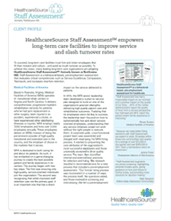Resource:
HealthcareSource Empowers Long-term Care Facilities to Improve Service & Slash Turnover
Learn how leading long-term care facilties slash turnoverrates, and now hire and retain employees that fit their mission and culture by using HealthcareSource Staff Assessment, formerly TestSource HSI.
To succeed, long-term care facilities must hire and retain employees that fit their mission and culture – and avoid as much turnover as possible. To achieve this vision, many leading long-term care organizations are adopting HealthcareSource Staff AssessmentSM, formerly known as TestSource HSI. Staff Assessment is a behavioral-based, pre-employment assessment that evaluates critical competencies such as Service Excellence, Compassion, Teamwork, and increases new-hire retention.
Medical Facilities of America
Based in Roanoke, Virginia, Medical Facilities of America (MFA) operates 41 transitional rehab centers in Virginia and North Carolina. It delivers comprehensive, progressive inpatient rehabilitation services for patients who’ve had joint replacement or other surgery, been injured in an accident, experienced a stroke, or have experienced other debilitating illnesses or injuries. MFA employs nearly 7,000 employees and hires over 3,000 employees annually. These employees deliver on MFA’s mission of being the pre-eminent provider of high-quality transitional and extended care in the country, and the employer of choice in the markets that it serves.
MFA is dedicated to both caring for and about its patients. As such, it has embarked on a game-changing journey to create the best possible patient and family experience in its centers. The journey began with two key steps. The first was ensuring only high-quality, service-oriented individuals join the organization. The second was recognizing that while improved staff retention was not the primary goal, it is an important one that has a direct impact on the service delivered to patients.
In 2010, the MFA senior leadership team developed a customer service plan designed to build on one of the organization’s greatest strengths: delivering high-quality patient care and rehabilitative outcomes. Realizing that its employees were the key to success, the leadership team focused on how to systematically hire and retain service-oriented employees, understanding that any service initiatives would not work without the right people to execute them. A corporate-wide, cross-functional project team was assembled and charged with revamping the MFA hiring process. It started by pinpointing the core attributes of the organization’s most successful employees and those universally accepted to drive quality service. The team then identified internal and external best practices for selection and hiring. The research resulted in recommendations for a new process that included a pre-employment assessment. “Our former hiring process was inconsistent in a number of ways: the process itself, the questions asked, and those involved in screening and interviewing. We felt a pre-employment assessment would help identify employees that were the best fit for our organization and the job at hand, while making the hiring process more efficient,” explains Renee Sowers, the Director of HR Services for MFA.
The team researched numerous solutions. After an exhaustive evaluation, it recommended HealthcareSource Staff Assessment because it was completely health care focused, could be easily integrated into the selection and hiring process, was easy to use, and would allow MFA to monitor results. At the same time, the team appreciated HealthcareSource’s willingness to customize the tool to reflect its cultural and organizational requirements. According to Sowers, MFA couldn’t have asked for an easier implementation. Today, all 41 facilities are using the solution to conduct structured interviews. “The interview guide has facilitated a new and improved panel interview process and allows us to conduct consistent and meaningful interviews,” states Sowers.
Within the first six months of using Staff Assessment, MFA hired 240 fewer employees and reduced turnover for the same year-over-year period by 24%. “Staff Assessment has had a measurable impact on our turnover and a positive impact on the quality of our hires. In a recent internal survey on the impact of the new hiring and orientation processes, approximately 80% of our Administrators, Directors of Nursing, and Human Resource Managers indicated that Staff Assessment is working very well. More importantly, 92% of the Center Administrators report the quality of hires from a service perspective has improved and 95% report the patient and/or family experience is improving,” concludes Sowers.
Presbyterian Manors of Mid-America
For more than 60 years, Presbyterian Manors of Mid-America has served seniors in Kansas and Missouri with quality living options. Of the 17 active communities that the organization operates, 16 are continuing care retirement communities (CCRCs) and one is an assisted living facility. Presbyterian Manor’s nearly 1,900 employees are charged with serving approximately 2,000 residents through the organization’s mission of providing Christian-based retirement living and health care services through a continuum of care, dedicated to the values of service, respect, dignity and independence.
The organization had long relied on behavioral-based interviewing in an attempt to hire for the best fit, but had found the process lacking. “Those conducting interviews weren’t consistently implementing this technique. As a result, some managers became more focused on filling positions than in finding the right fit,” explains Jarene Fluker, Director of Quality and Risk Analysis for Presbyterian Manors. The organization may hire up to 1,000 applicants per year and was experiencing a turnover at the rate of industry averages. According to Fluker, Presbyterian Manors knew that a high turnover rate could negatively impact resident and employee satisfaction, the quality of services, and the organization’s bottom line.
The organization believes that by retaining employees with characteristics that fit its mission, it will achieve its goals of delivering quality services and ensuring continuous quality improvement at the bedside, while offering its employees fulfilling work. Fluker spearheaded an initiative to find a better way to interview potential employees. After evaluating the options, she was convinced that HealthcareSource Staff Assessment was the best fit. “I was impressed that HealthcareSource had an appreciation for our mission, and that the solution is healthcare-specific and easy to use. While we want to spend less time hiring and training our employees, we want to do it easily,” recalls Fluker.
Another key reason for choosing Staff Assessment is that it provides interview questions and guidance on how to assess the candidate’s responses. “Without guidance on evaluating answers, behavioral-based interviewing provides limited value,” continues Fluker. Presbyterian Manors chose to pilot the solution in one of its CCRCs in Wichita headed up by a forward-thinking executive director. According to Fluker, implementation was a breeze. “Our HealthcareSource representative gave a training session in the morning and we were up and running that afternoon on the web-based system.”
During the first quarter of 2010, 18 employees left the Wichita community, a 17% turnover rate. During the same quarter of 2011, with Staff Assessment in place, the community reduced turnover by 50%. Fluker conservatively assigns a cost of $3,000 to each person leaving the organization. “The fallout from a bad hire goes way beyond that cost.” Presbyterian Manors realized a savings of nearly $24,000 in one quarter, and expects to save close to $100,000 for the year – in one community alone.
Presbyterian Manors then implemented Staff Assessment in two additional communities where department heads are in charge of interviewing and turnover had averaged 17-18% per quarter. “Because we make better hiring decisions with Staff Assessment, we expect to retain 28 people within those two communities next quarter, for an immediate savings of over $70,000 and a total savings of over $300,000 in 2011. That’s a tremendous return on investment,” states Fluker. At the same time, Fluker estimates the two communities save nearly 36 hours per quarter by avoiding unnecessary interviewing of unqualified candidates. “We are now free to spend more time with residents. And because we are better filling our positions, our employees are happier and this translates to better bedside service,” concludes Fluker.
Willow Valley Retirement Communities
Established in 1984, Willow Valley Retirement Communities comprises four independent living communities and supported living healthcare facilities within a two-mile radius just outside of Lancaster, Pennsylvania. With a focus on continuing care, the organization employs 1,200+ employees to serve its 2,400+ residents.
Nursing assistants make up 8% of Willow Valley’s employee population and are critical to delivering on the organization’s mission of enriching the lives of residents by engaging the mind, body, and spirit. “We seek reliable individuals who can get along with a wide variety of people, will respect our residents, and have a passion for service,” explains Patty Pasquino, Employment Coordinator for Willow Valley.
While Willow Valley had used a behavioral-interviewing process as part of its hiring practice, it continually seeks a better methodology to determine who is and isn’t a good candidate. “Because behavioral interviewing doesn’t give much guidance on how to interpret a candidate’s answers, you end up relying on gut instinct or personal preference,” says Pasquino. Since Willow Valley was already using HealthcareSource’s Position Manager® applicant tracking software, Pasquino decided to try HealthcareSource Staff Assessment.
After a brief training session, Pasquino, four nurse managers, and two directors were using Staff Assessment. After conducting phone screenings, they use Staff Assessment to further assess candidates. “Staff Assessment augments our phone screening, highlighting potential trouble spots, giving guidance on how and where to further probe, and providing more structure for decision making,” says Pasquino.
Since implementing Staff Assessment, Willow Valley has seen a significant improvement in new-hire retention. Out of 36 hires it made using Staff Assessment, the organization lost only six, a 12% reduction in turnover when compared to the previous year. “We are extremely pleased at how much better we can now identify the best applicants for our facilities,” concludes Pasquino.

